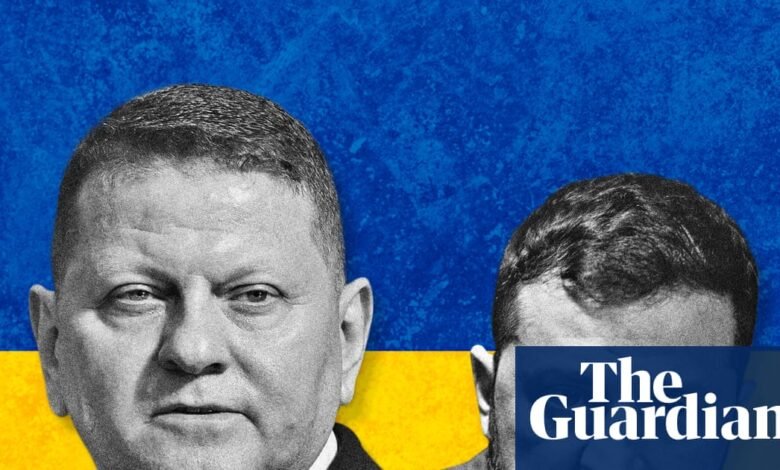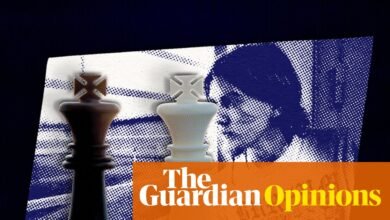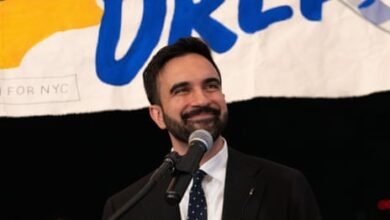General, envoy … future Ukraine president? Valerii Zaluzhnyi’s London waiting game | Ukraine

One afternoon in early March, three days after the disastrous showdown between Donald Trump and Volodymyr Zelenskyy at the White House, there was a flurry of telephone activity at the Ukrainian embassy in London.
JD Vance’s team was on the line and wanted to set up a call with Valerii Zaluzhnyi, Ukraine’s ambassador to the UK and formerly the commander in chief of the army.
The US vice-president had been instrumental in provoking the confrontation between Trump and Zelenskyy in the Oval Office, from his perch on an adjacent sofa. Now, Vance and others in Trump’s orbit were apparently sounding out potential alternatives to the troublesome Zelenskyy.
Vance’s team “tried various diplomatic and other channels” to get through to Zaluzhnyi, said one of three sources with knowledge of the efforts who spoke with the Guardian. Zaluzhnyi, after consultation with Zelenskyy’s chief of staff, refused to take the call.
The episode was reflective of the political tightrope that Zaluzhnyi has walked since Zelenskyy dismissed him as army chief last February and dispatched him to London. On the one hand, accustomed to working within a strict military hierarchy, Zaluzhnyi remains loyal to the government he serves. On the other, many – both at home and abroad – see him as Ukraine’s natural next president, and are pushing him to launch a political campaign.
This account is based on interviews with several people close to Zaluzhnyi, as well as political insiders, diplomats and others with direct knowledge of the described events. Most requested anonymity, given the sensitivity of the topic. Many of the details are being reported for the first time.
No election is scheduled in Ukraine, with voting legally and technically impossible while the country is at war. Even Zelenskyy’s staunchest domestic opponents do not support holding a vote now, and since the Oval Office disaster, relations with Trump have also improved. Last week, the Ukrainian president was back at the White House in a more cordial atmosphere.
But everyone in Ukraine knows that sooner or later, politics will return. And when that happens, polling suggests that Zaluzhnyi, who led the successful repelling of the Russian onslaught at the beginning of the war, is the only candidate who would pose a serious threat to Zelenskyy.
Zaluzhnyi has never publicly declared any political ambitions, and declines almost all interview requests. His team carefully manages his public appearances in London to avoid events where awkward questions could be asked. But there has been a steady flow of political pilgrims to the Ukrainian embassy, located in a mansion near Holland Park, west London, to offer services, express support or try to divine whether the general has plans to run for office.
Those visitors have included Ukrainian MPs, civil society activists, representatives of wealthy businesspeople and even the disgraced former Trump adviser Paul Manafort, who visited Zaluzhnyi to pitch his services as a political consultant in any future election campaign. Zaluzhnyi turned down the offer.
Another frequent visitor has been Andriy Yermak, Zelenskyy’s powerful chief of staff. In a meeting last November, said a knowledgable source, Yermak suggested to Zaluzhnyi that he should formally join the president’s political team, to present a united front before future elections.
Zaluzhnyi declined, but also pledged loyalty, up to a point. He promised Yermak he would not criticise Zelenskyy in public while the war continued, said the source, and also gave assurances he would not give the presidential office any nasty surprises. “If I do decide I want to go into politics, you will hear it from me first, privately,” Zaluzhnyi told Yermak.
So far, Zaluzhnyi has not communicated that message, although there is an increasing belief in Kyiv that he is readying a political run. The general is coy even privately with close associates about his plans, but many assume he is just biding his time before entering the fray.
“He has chosen the smartest tactic,” said Volodymyr Fesenko, a Kyiv-based political analyst. “He will make the final decision only at the last moment, just before elections.”
Zaluzhnyi was 48 when Zelenskyy promoted him to commander in chief in July 2021, a move which came as a surprise to most of the army top brass, including the man himself.
“Zaluzhnyi was a bold and ambitious commander, but he was also a bit of a goofball, better known for clowning around with his troops than disciplining them,” wrote journalist Simon Shuster in his biography of Zelenskyy. It was exactly this personable, unconventional streak that appealed to Zelenskyy, the former comedian and actor who had sensationally ascended to the presidency two years earlier.
A few months after Zaluzhnyi’s appointment, Russia began massing troops across the border. The Biden administration warned publicly that Vladimir Putin could be planning a full-scale invasion of Ukraine. In the months between those first US warnings in October 2021 and the invasion in February 2022, Zaluzhnyi frequently pushed for more intensive preparations for a possible Russian attack. Zelenskyy, however, was unsure the invasion scare was real, and felt that even it was, excessive preparation would sow panic among the population and could give the Russians the excuse they were looking for to invade.
At a meeting of Ukraine’s security council on 22 February, Zaluzhnyi and the then defence minister, Oleksiy Reznikov, spoke in favour of introducing martial law, while Zelenskyy still worried about creating panic. In the end, the council voted to adopt lesser measures. Russia invaded two days later. These disagreements over the preparations for war, which mostly took place in private and were overshadowed by Zelenskyy’s heroic stand after the invasion began, could come back into focus if there is indeed an electoral battle between the two men.
Once the invasion happened, Zelenskyy initially left military strategy to his commander, while he focused on marshalling international support for Kyiv. Zelenskyy became the international symbol of Ukrainian resilience; Zaluzhnyi achieved cult status inside the country as a war hero.
As the conflict dragged on, however, there was increasing tension between the two men. Almost every strategy meeting ended in disagreement. There was also a growing uneasiness among the presidential team about Zaluzhnyi’s popularity, as shown by secret internal polling. He seemed to be developing an untouchable mythical status.
By February last year, Zelenskyy had had enough. After months of speculation, he dismissed Zaluzhnyi and announced he was sending him to London as ambassador, claiming the army needed an injection of new ideas. “This is not about names, and even more so, not about politics,” the president said, explaining the decision at the time. Few believed him. But Zaluzhnyi took his new orders calmly. During a private meeting, the two men parted on a warm note, and Zaluzhnyi even posed for a photograph with Zelenskyy to prove there was no bad blood. It was the last time they had a sit-down meeting.
When Zaluzhnyi arrived in London, the British establishment realised this new diplomatic relationship would requite delicate handling. Many senior officials had become close to Zaluzhnyi and his team during the war, but keeping him involved in military planning discussions might irritate the Zelenskyy administration, they realised, and show disrespect to Oleksandr Syrskyi, Zaluzhnyi’s replacement as army chief.
“The decision was made that regardless of many warm personal connections, the relationship would be reset to a more traditional diplomatic relationship, led by the Foreign Office,” said a British defence official.
For Zaluzhnyi, who had spent the first two years of the war in a prolonged state of adrenaline-fulled sleep deprivation, the new life in London was a strange transition. He posted selfies with his wife from tube platforms and walks along the Thames.
The couple even made the occasional trip to the theatre, including a pre-Christmas visit to see the play Barcelona, starring Lily Collins. The unusually intense security sweep of the building before the performance led staff there to assume a member of the royal family would be visiting, said a source at the theatre. There was confusion when the secret VIP couple arrived and nobody recognised them.
Back home, where Zaluzhnyi has the second-most recognisable face in the country, photographs from his new life have not always gone down well. A moody black-and-white photoshoot for Ukrainian Vogue recently launched a slew of sarcastic memes. But Zaluzhnyi has also stayed in touch with many army commanders, and follows combat activities from secure video screens in his office that beam live footage from the battlefield. “Valerii Fedorovych has left the war, but the war has not left Valerii Fedorovych,” said an associate, using Zaluzhnyi’s name and patronymic.
In private conversations, Zaluzhnyi has not confirmed he plans to go into politics, but he has allowed himself to speculate on what kind of platform he could propose if he does make the decision. Those close to him say he sees Israel as a model, despite its current bloody actions in Gaza, viewing it as a small country surrounded by enemies and fully focused on defence.
He would style himself as a tough, wartime leader who would promise “blood, sweat and tears” to the Ukrainian people in return for saving the nation, channelling Winston Churchill. In one private conversation, he said: “I don’t know if the Ukrainian people will be ready for that, ready for these tough policies.”
After Trump humiliated Zelenskyy in the Oval Office in February, the Ukrainian president flew to London to strategise with Keir Starmer on how best to mend the relationship. The situation looked dire, and some in the US administration were openly discussing what mechanisms they might be able to use to replace the Ukrainian president. “I don’t know if we can ever work with Zelenskyy again,” said the Republican senator Lindsey Graham, publicly suggesting Zelenskyy should resign. Soon after, Vance’s office tried to place the call to Zaluzhnyi.
For Zaluzhnyi, whatever bad blood there was with Zelenskyy, siding with the Trump team against his own president was not an option. He met Zelenskyy at the airport in London, and posted on his social media channels a photograph of the two men shaking hands on his social media channels. “The road ahead won’t be easy, but together, we will overcome every challenge,” he wrote. It was a demonstrative show of unity at what was one of Ukraine’s lowest moments since the start of the full-scale invasion.
“A lot of his supporters didn’t understand why he did this,” said a source close to Zaluzhnyi. “But it was his principled position: Ukraine has been humiliated and we have to be united.”
This cautiousness has started to frustrate some Zelenskyy opponents in Kyiv, who feel Zaluzhnyi offers their best chance of political change. “He’s a military guy, he understands taking orders and working within a structure, but he doesn’t understand how to go on manoeuvres politically,” said a former senior official, who hopes to persuade Zaluzhnyi to run. “A real leader should have taken the Vance call, he should be making moves. But how to convince him?”
Another source, who knows Zaluzhnyi and is also a former senior official, said the general would be too wary of internal destabilisation to launch a political campaign against Zelenskyy. “I don’t believe in the battle of the two Zs, it would be a disaster for the country and I don’t think he is ready for that. So I think he would only stand if Zelenskyy can be persuaded to step aside,” said the source.
Last month, Zaluzhnyi arrived in Kyiv, for a six-day summit of Ukrainian ambassadors. The envoys listened to speeches from Zelenskyy and military leaders, and visited areas close to the frontline in Zaporizhzhia region. For most of the diplomats, it was a rare a firsthand taste of the war to take back to their host countries. For Zaluzhnyi, it must have been a surreal experience to return to the front as part of a diplomatic junket.
“He was friendly, but cautious,” said another ambassador who was present. “You could see he was wary of being too open with people he didn’t know personally; he doesn’t know who is on which side.”
By chance, the summit meant Zaluzhnyi was in Kyiv during a wave of street protests against a government plan to neuter two anti-corruption bodies. The rallies spooked Zelenskyy’s team and led to a swift U-turn. Some hoped this could be the moment Zaluzhnyi broke publicly with Zelenskyy. “A lot of people were waiting for him to say something, but he was silent,” said Inna Sovsun, an opposition MP.
After the summit, Zaluzhnyi stayed on for a week in Kyiv and took numerous meetings with various political and civic figures. Rumours swirled that he was finally sounding out members of a future political team.
Those around him deny the discussions were about politics. “He has said many times that while the war is going on, we have to work to save the country and not think about elections, and that has not changed,” said Oksana Torop, a former BBC journalist now working as a media adviser to Zaluzhnyi. “He talks with lots of people about defence and security, but this is nothing to do with elections,” she added.
Asked whether the presidential office views Zaluzhnyi as a political threat, the Zelenskyy aide Mykhailo Podolyak said: “Zaluzhnyi is seen by the president as a part of the team, as an ambassador in an important country … Anyway, there is no real political process at the moment.”
What about when those political processes restart, whenever that may be? “I’m not ready to say what would happen then, and how different people might act,” said Podolyak. “It’s all very unpredictable.”




